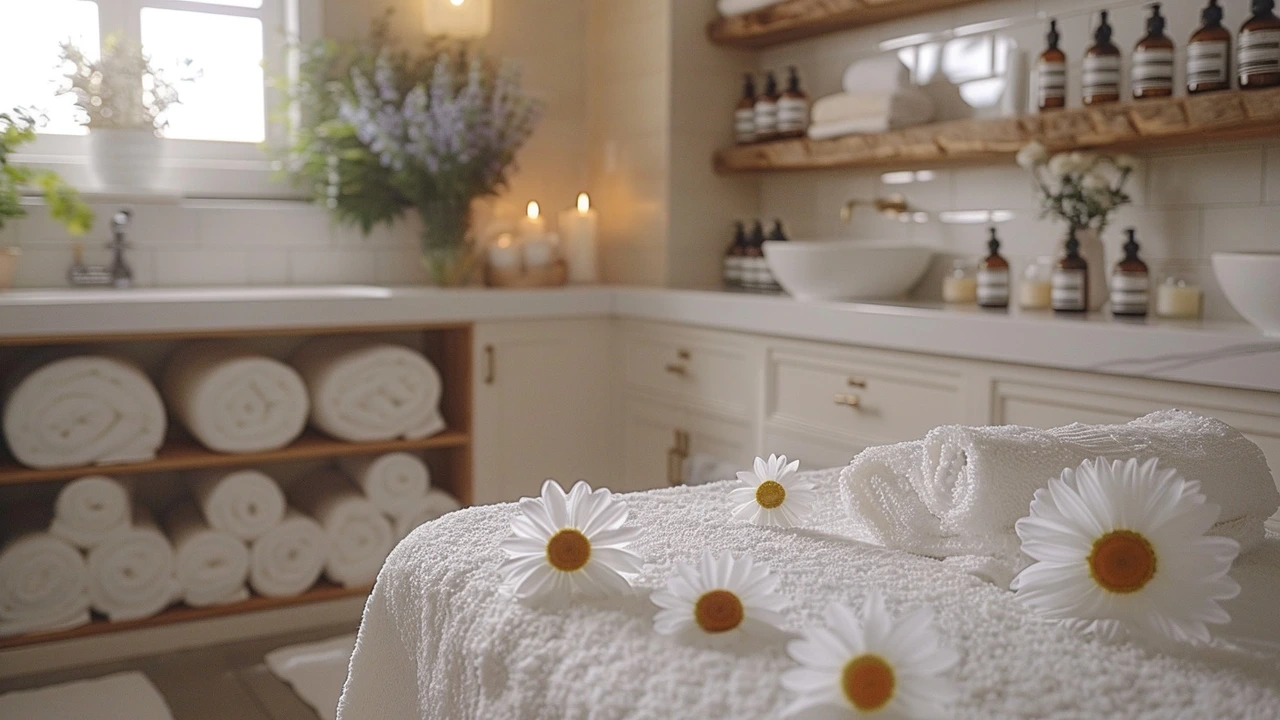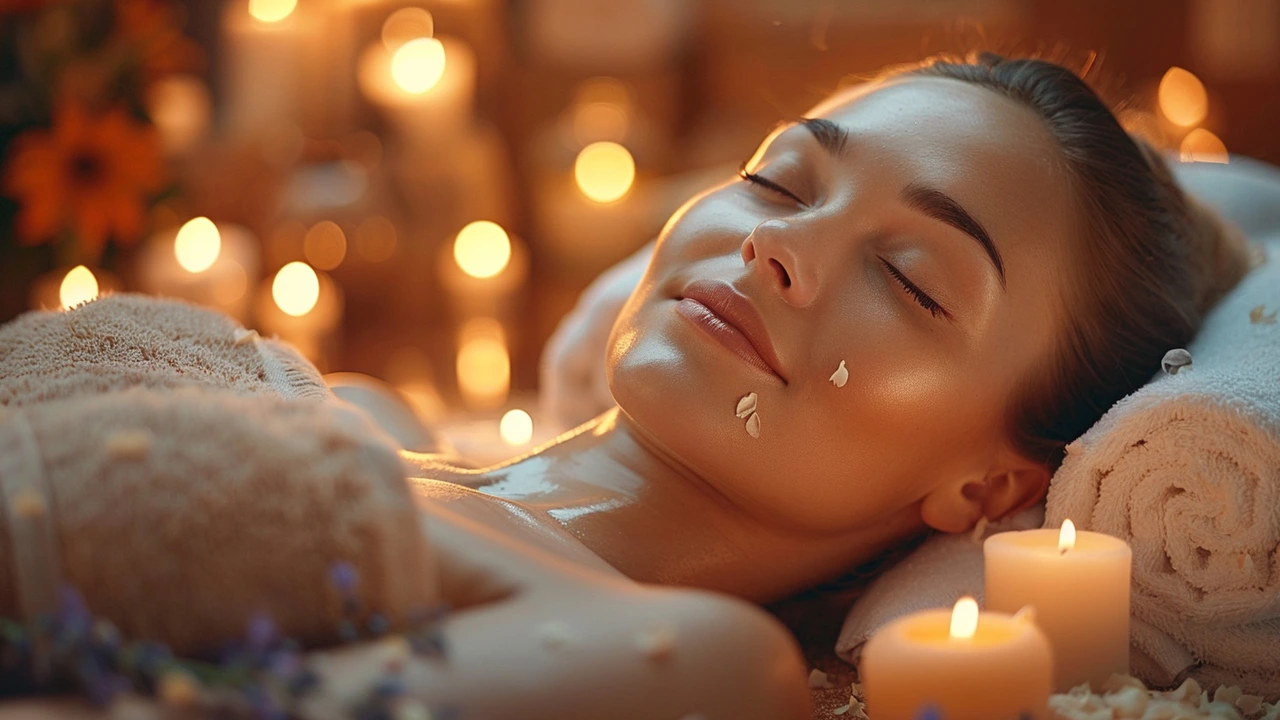Step into the world of aromatherapy massage, a therapeutic practice that combines the benefits of massage with the healing properties of essential oils. This holistic approach not only aims to relax your muscles but also to uplift your spirit through the power of scent.
With growing popularity, many seek to understand what makes aromatherapy massages more than just a luxury. This guide will explore the essential facts and tips you need to know to make the most of your experience.
- What is Aromatherapy?
- The Science Behind Aromatherapy
- Health Benefits
- Popular Essential Oils and Their Benefits
- Tips for Your Aromatherapy Massage
- What to Expect During a Session
What is Aromatherapy?
Aromatherapy is a holistic healing treatment that uses natural plant extracts to promote health and well-being. This practice, also known as essential oil therapy, has been around for thousands of years. Essential oils, derived from various parts of plants including flowers, bark, stems, leaves, and roots, are the core component of aromatherapy. These oils are typically used through inhalation or applied directly to the skin when diluted in a carrier oil.
The concept of aromatherapy dates back to ancient civilizations. The Egyptians, Greeks, and Romans used aromatic oils for bathing, massages, and even medical treatments. The term ‘aromatherapy’ itself was coined in the early 20th century by René-Maurice Gattefossé, a French chemist, who discovered the healing properties of lavender oil when he used it to treat a burn on his hand.
Today, aromatherapy is recognized for its potential to treat a variety of conditions. People commonly use it to manage pain, improve sleep quality, reduce stress and anxiety, and even boost immunity. It’s not just about the pleasant smells; these oils have significant therapeutic properties that can affect both the body and mind. For instance, lavender oil is well-known for its calming effects, while peppermint oil is often used to relieve headaches and improve concentration.
Essential oils work through different mechanisms. When inhaled, the scent molecules travel from the olfactory nerves directly to the brain, impacting the amygdala, the emotional center of the brain. When applied to the skin, the oils are absorbed into the bloodstream, providing localized benefits such as muscle relaxation or skin healing. It's fascinating how such a simple, natural product can have complex and powerful effects on our health.
However, it’s important to use essential oils correctly to reap their benefits and avoid potential side effects. Always dilute essential oils in a carrier oil before applying to the skin to prevent irritation. Some people might be sensitive, so doing a patch test is recommended. It’s also crucial to consult with a professional, especially if you are pregnant, nursing, or have underlying health conditions, to ensure the safe use of aromatherapy.
"Aromatherapy can be a powerful tool in balancing both physical and emotional health," says Jane Buckle, PhD, RN, author of 'Clinical Aromatherapy: Essential Oils in Healthcare'.
The beauty of aromatherapy lies in its versatility. Whether through a relaxing massage, a soothing bath, or even a diffuser, there are multiple ways to incorporate these beneficial oils into your daily routine. In the subsequent sections, we will explore how aromatherapy works during a massage and delve into the scientific backing for its acclaimed health benefits.
The Science Behind Aromatherapy
Aromatherapy, often dismissed as a mere indulgence, has a strong foundation in science. This practice employs essential oils, which are concentrated extracts from plants, to enhance both physical and emotional well-being. When these oils are inhaled or absorbed through the skin, they interact with your brain and body in fascinating ways.
When you inhale the scent molecules from essential oils, they travel through your nose and stimulate the olfactory system. This system includes all the organs and brain parts involved in processing smell. One critical region affected is the limbic system, which is involved in emotional responses and memory formation. That is why certain scents can evoke vivid memories or powerful emotions.
Dr. Jane Buckle explains, "The limbic system is directly connected to parts of the brain that control heart rate, blood pressure, breathing, and stress levels. This connection suggests why certain essential oils can have such profound impacts on these functions."
Beyond inhalation, these oils can also be absorbed through the skin. During a massage, the combined effect of touch and aromatic compounds enhances the therapeutic outcome. Essential oils are tiny enough to penetrate the skin's surface, and from there, they enter the bloodstream, directly delivering their benefits throughout the body. This is particularly useful for relieving muscle pain and inflammation.
Scientific studies reinforce the health benefits of aromatherapy. For example, a 2012 study published in Evidence-Based Complementary and Alternative Medicine found that patients who received aromatherapy massage showed significant improvement in pain and mood compared to those receiving standard massage therapy. Another study revealed that lavender essential oil can significantly reduce anxiety and improve sleep quality among patients in intensive care units.
However, it's essential to use high-quality essential oils to achieve these benefits. Synthetic oils can lack the compositions needed for genuine therapeutic effects. Always opt for pure, organic oils and ensure they are sourced from credible suppliers. Additionally, certain essential oils like eucalyptus and tea tree should be used with caution, especially around children and pets.
Understanding the science behind aromatherapy massages can deeply enhance your experience. Being informed allows you to choose the right oils for your needs and fully appreciate the intricate interaction between mind, body, and essential oils.

Health Benefits
Aromatherapy massage is not just about relaxation; it offers a myriad of health benefits that can significantly improve one's quality of life. One of the primary benefits is the reduction of stress and anxiety. The use of essential oils such as lavender, bergamot, and chamomile during the massage helps to soothe the mind, promoting a sense of calm. According to the Anxiety and Depression Association of America, over 40 million adults experience anxiety disorders, many of whom have found relief through aromatherapy massage.
In addition to mental well-being, aromatherapy massage also has a positive impact on physical health. For instance, it can alleviate muscle tension and pain. Essential oils like eucalyptus and peppermint have anti-inflammatory properties that can help reduce soreness. This is especially beneficial for individuals suffering from conditions such as fibromyalgia or chronic muscle pain. A study published in the Journal of Alternative and Complementary Medicine found that participants who received regular aromatherapy massages reported significant reductions in pain intensity.
Another noteworthy benefit is the improvement in sleep quality. Insomnia and other sleep disorders affect millions globally, but aromatherapy massage can be a natural remedy. Oils like clary sage and sandalwood are known for their calming effects, helping to regulate sleep patterns. A study in the journal Evidence-Based Complementary and Alternative Medicine concluded that participants who used essential oils experienced better sleep quality and duration.
Moreover, aromatherapy massage can enhance the immune system. Certain essential oils, such as tea tree and lemon, have antimicrobial properties that can boost the body's natural defenses. Regular sessions can help reduce the frequency of common illnesses like colds and flu. This holistic approach to health means that the body is not only pampered but also fortified against potential threats.
The benefits of aromatherapy massage also extend to improved digestion. Digestive issues such as bloating, constipation, and indigestion can be alleviated with the use of specific oils like ginger and fennel. These oils can stimulate the digestive system, promoting regularity and overall gut health. A healthy digestive system is crucial for absorbing nutrients and keeping the body in optimal condition.
Additionally, aromatherapy massages can improve skin health. Essential oils like lavender and rose are rich in antioxidants, which help to fight free radicals and promote healthy, glowing skin. Regular massages can enhance blood circulation, ensuring that nutrients and oxygen reach the skin cells effectively. This can result in a more youthful and radiant appearance.
In a nutshell, aromatherapy massage is a multifaceted therapy that offers not just emotional and mental relief, but also physical healing. Whether you are looking to de-stress, alleviate pain, enhance your immune system, improve your digestive health, or achieve better skin, integrating this practice into your routine can be a game-changer. As the famed aromatherapist Robert Tisserand once said,
"The power of essential oils can enhance health and happiness in a potent and profound way."
This age-old therapy continues to evolve, offering a holistic approach to modern health and wellness challenges.
Popular Essential Oils and Their Benefits
When it comes to aromatherapy massage, the choice of essential oils can make all the difference. Each oil offers its unique set of benefits, aiding in everything from stress relief to better skin health. Understanding these benefits can help you decide which oils are best suited for your needs.
Lavender Oil
Lavender is often the first essential oil people think of, and for good reason. Known for its calming effects, it’s frequently used to treat anxiety, depression, and insomnia. When applied during a massage, lavender oil can soothe sore muscles and alleviate tension. A study published in the International Journal of Psychiatry in Clinical Practice found that lavender oil had significant effects on reducing anxiety levels.Peppermint Oil
If you need a pick-me-up, peppermint oil is your go-to. It’s invigorating and helps boost energy levels and mental clarity. It also has analgesic properties, making it ideal for relieving headaches and muscle pain. According to research in the Journal of Pain Research, peppermint oil applied topically can reduce the intensity of tension headaches.Eucalyptus Oil
Eucalyptus oil is well-known for its anti-inflammatory and decongestant properties. It can be particularly beneficial for alleviating respiratory issues and sinus congestion. During a massage, it helps in reducing muscle stiffness and joint pain. Many massage therapists recommend eucalyptus oil for its cooling properties, which can soothe irritated skin.According to Dr. Vivian Lunny, a certified aromatherapist, "Eucalyptus oil is a must-have for its broad spectrum of benefits, especially in respiratory support and pain management."
Tea Tree Oil
Tea tree oil is a powerhouse when it comes to antibacterial and antifungal properties. It’s often used in skincare routines to combat acne and skin infections. When used in a massage, it helps to cleanse and revitalize the skin, leaving you feeling refreshed. The British Medical Journal highlights that tea tree oil has been proven effective against multiple types of skin pathogens.Chamomile Oil
Chamomile isn’t just for tea. Its oil form brings anti-inflammatory and soothing properties into play. It’s excellent for people with sensitive skin or those suffering from conditions like eczema. Chamomile oil is also known to promote sleep and reduce feelings of anxiety and depression. Applying it during a massage can provide significant relief from muscle spasms and cramps.Jasmine Oil
Jasmine oil is celebrated for its uplifting and aphrodisiac qualities. It’s great for boosting mood and lowering stress levels. Many people find that jasmine oil helps with symptoms of depression and calms the nerves. Its sweet, exotic scent makes it a popular choice for massages aimed at promoting mental clarity and emotional well-being.Frankincense Oil
Often referred to as the “king of oils,” frankincense is excellent for aging skin and stress relief. It has been shown to reduce the appearance of scars and stretch marks. During massage, this oil helps in deep relaxation and balancing emotions. Recent studies have noted its potential in boosting the immune system and fighting inflammation.With such a diverse array of essential oils available, selecting the right one can significantly amplify the benefits of your aromatherapy massage. Always consult with your massage therapist to choose an oil that best complements your health needs and personal preferences.

Tips for Your Aromatherapy Massage
Before diving into the world of aromatherapy massage, it's important to be prepared. Whether you're new to it or a seasoned participant, these tips can help you optimize your experience. First, always discuss your allergies and sensitivities with your massage therapist. Many essential oils possess potent properties, and knowing which ones to avoid can prevent uncomfortable reactions. Common allergens include lavender and peppermint oils.
Next, choose the right essential oils for your needs. Different oils offer different benefits. For instance, lavender is great for relaxation and stress relief, while eucalyptus is known for its respiratory benefits. Talk to your therapist about what you hope to achieve through the massage, and they can recommend oils accordingly.
“The sense of smell is one of the most direct routes to the brain's emotional processing center, the limbic system,” says Dr. Pam Peeke, a well-known health expert. “Aromatherapy massages can physically and mentally benefit the recipient through this strong connection.”
Arrive at your session well-hydrated and avoid heavy meals beforehand. Drinking water helps flush out toxins, making the massage more effective. Eating lightly helps you stay comfortable, as lying on the massage table with a full stomach can be unpleasant.
Be mindful of the setting. Ensure the room is calm and quiet, with dim lighting and soothing music. The environment significantly impacts your relaxation level, contributing to the overall effectiveness of the massage. If you’re having the massage at home, consider lighting some unscented candles to add to the ambiance.
Another key tip is to communicate with your therapist. Let them know about your pressure preferences and any areas of tension you want them to focus on. Communication ensures you get the most out of your aromatherapy massage, turning it into a tailored experience.
After the session, take your time getting up and moving around. Aromatherapy massages can leave you feeling light-headed or deeply relaxed, so give your body a moment to adjust. Drink water post-session to help with detoxification and prevent soreness.
Lastly, consider the frequency of your sessions. While a single aromatherapy massage can be beneficial, regular sessions offer cumulative benefits, helping to maintain mental and physical health. Aim for at least one session per month, but tailor this to your personal needs and budget.
Keeping these tips in mind can greatly enhance the effectiveness of your aromatherapy massage, providing you with a deeply relaxing and beneficial experience.
What to Expect During a Session
Walking into an aromatherapy massage session for the first time can be both exciting and a bit intimidating. It's good to know what to expect, so you can fully relax and reap the benefits. Typically, your session will start with a brief consultation where the therapist asks about your health, any areas of concern, and your preference for essential oils. This helps tailor the experience to suit your individual needs.
Once the consultation is complete, you'll be asked to lie down on a massage table. The room will likely be softly lit and may have relaxing music playing in the background to set a calming atmosphere. Your therapist will then blend a mixture of essential oils, often a combination of carrier oils and specific essential oils targeted to address your concerns. Each oil has different properties, so communicating your needs is essential.
During the massage, the therapist will apply the oil blend to your skin using smooth, rhythmic strokes. The essential oils are not just a sensory delight; they penetrate the skin, enter the bloodstream, and start working their magic. The human body has more than 5 million pores. These pores act as gateways for the essential oils to get absorbed. Besides, the aromatic compounds are inhaled, interacting with the limbic system, the part of the brain that controls emotions and memory.
"Essential oils used in aromatherapy stimulate smell receptors in the nose, which then send messages through the nervous system to the limbic system—the part of the brain that controls emotions," states a publication from Johns Hopkins Medicine.
Throughout the session, you can expect a mix of different massage techniques such as kneading, rolling, and gentle stretching. The types of massage motions and the pressure applied can vary depending on your comfort and your therapist's assessment of your muscle condition. Oils like lavender and chamomile may help in relaxing tense muscles, while peppermint and eucalyptus can invigorate your senses.
A typical session lasts between 60 to 90 minutes. After the massage ends, you might feel sleepy yet incredibly relaxed. Your therapist may recommend drinking plenty of water to help flush out toxins. Some people even report feeling a sense of euphoria as the combined effect of touch and aroma works wonders on the mind and body. Regular sessions can have cumulative benefits, improving your mental and physical well-being over time.


 Health and Wellness
Health and Wellness